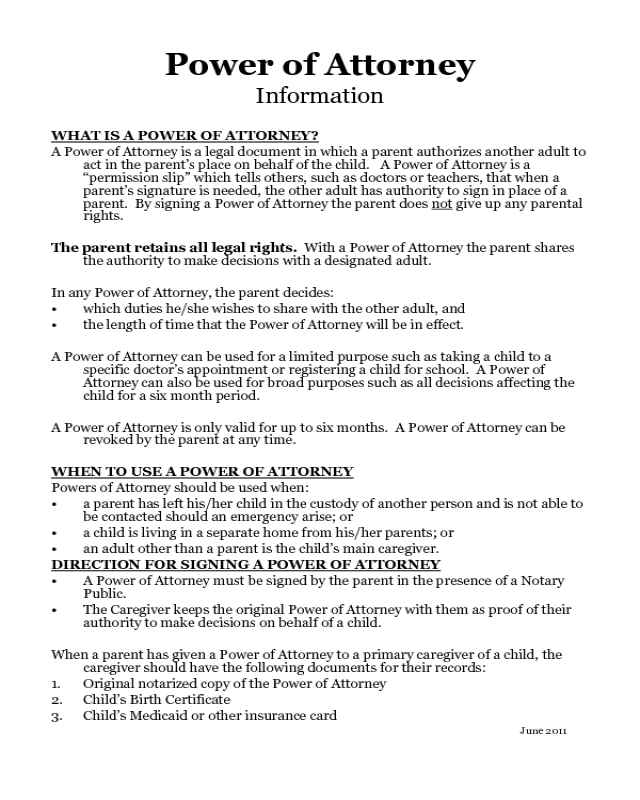- Health Care Power of Attorney over Minor Child - Arizona
- Power of Attorney for Child - Arkansas
- Power of Attorney for a Minor Child
- AOC-796 - Medical Power of Attorney for Minor Child - Kentucky
- Non-Durable Power of Attorney for Health Care of Minor Child - Minnesota
- Power of Attorney and Designation of Temporary Guardian for Minor Child - Maryland
Fillable Printable Power of Attorney for a Minor Child
Fillable Printable Power of Attorney for a Minor Child

Power of Attorney for a Minor Child

Power of Attorney
Information
WHAT IS A POWER OF ATTORNEY?
A Power of Attorney is a legal document in which a parent authorizes another adult to
act in the parent’s place on behalf of the child. A Power of Attorney is a
“permission slip” which tells others, such as doctors or teachers, that when a
parent’s signature is needed, the other adult has authority to sign in place of a
parent. By signing a Power of Attorney the parent does not give up any parental
rights.
The parent retains all legal rights. With a Power of Attorney the parent shares
the authority to make decisions with a designated adult.
In any Power of Attorney, the parent decides:
• which duties he/she wishes to share with the other adult, and
• the length of time that the Power of Attorney will be in effect.
A Power of Attorney can be used for a limited purpose such as taking a child to a
specific doctor’s appointment or registering a child for school. A Power of
Attorney can also be used for broad purposes such as all decisions affecting the
child for a six month period.
A Power of Attorney is only valid for up to six months. A Power of Attorney can be
revoked by the parent at any time.
WHEN TO USE A POWER OF ATTORNEY
Powers of Attorney should be used when:
• a parent has left his/her child in the custody of another person and is not able to
be contacted should an emergency arise; or
• a child is living in a separate home from his/her parents; or
• an adult other than a parent is the child’s main caregiver.
DIRECTION FOR SIGNING A POWER OF ATTORNEY
• A Power of Attorney must be signed by the parent in the presence of a Notary
Public.
• The Caregiver keeps the original Power of Attorney with them as proof of their
authority to make decisions on behalf of a child.
When a parent has given a Power of Attorney to a primary caregiver of a child, the
caregiver should have the following documents for their records:
1. Original notarized copy of the Power of Attorney
2. Child’s Birth Certificate
3. Child’s Medicaid or other insurance card
June 2011

I declare that I am the PARENT and/or LEGAL GUARDIAN,
PARENT NAME
BIRTH DATE
SOCIAL SECURITY #
CITY/STATE of RESIDENCE
of this minor CHILD,
CHILD NAME
BIRTH DATE
SOCIAL SECURITY #
CITY/STATE of RESIDENCE
CAREGIVER NAME
BIRTH DATE
SOCIAL SECURITY #
CITY/STATE of RESIDENCE
Print Parent Name
NOTARY PUBLIC
My Commission Expires (Seal)
Pursuant to 45-5-104 NMSA, do hereby appoint this CAREGIVER, my true and lawful attorney in
fact, to act in my name, place and stead, in the event that I am unavailable and a decision must be
made and/or authorization given for the above named child regarding medical treatment, education
matters, participation in religious or recreational activities or in any other matters involving my child.
I authorize the Caregiver in this event to take any and all steps, as fully and for all intents and
purposes as I might do or could do if personally present. I understand that pursuant to the statute this
power of attorney terminates six months from the date executed and I may renew it at that time.
PARENT SIGNATURE
POWER OF ATTORNEY for a minor child
the ____________ day of the month of _______________________, 201_____.
(Photo Identification, Signature Witnessing & Notary Seal Required)
This affidavit was subscribed, sworn to and acknowledged before me this,
NOTARY PUBLIC ACKNOWLEDGMENT
I declare under penalty or perjury under the laws of the state of New Mexico that
the foregoing is true and correct.



